人教新目标版英语九年级全Unit 1 How can we become good learners? Section B 2a-3b课件(43张PPT无素材)
文档属性
| 名称 | 人教新目标版英语九年级全Unit 1 How can we become good learners? Section B 2a-3b课件(43张PPT无素材) | 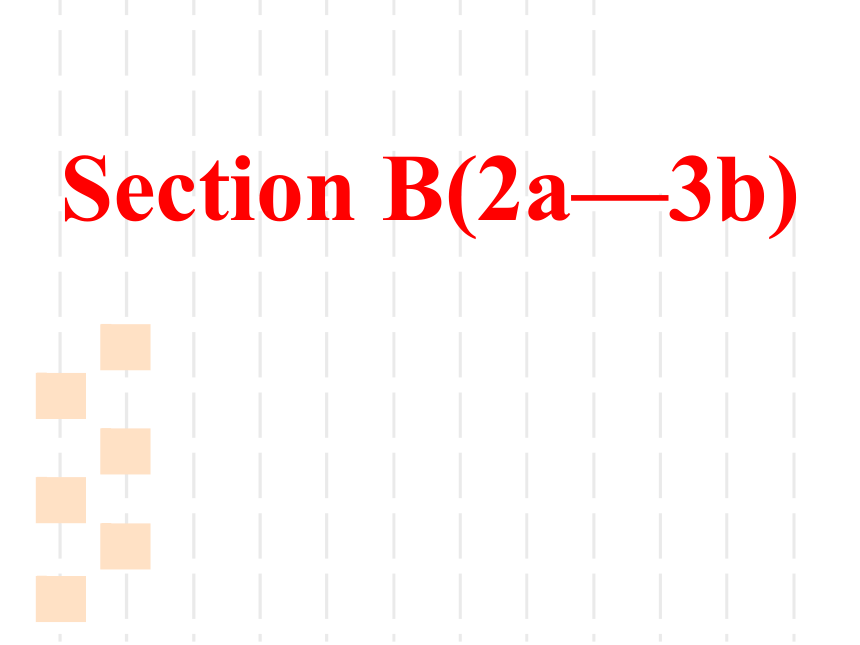 | |
| 格式 | ppt | ||
| 文件大小 | 1.5MB | ||
| 资源类型 | 教案 | ||
| 版本资源 | 人教新目标(Go for it)版 | ||
| 科目 | 英语 | ||
| 更新时间 | 2020-08-08 22:21:33 | ||
图片预览

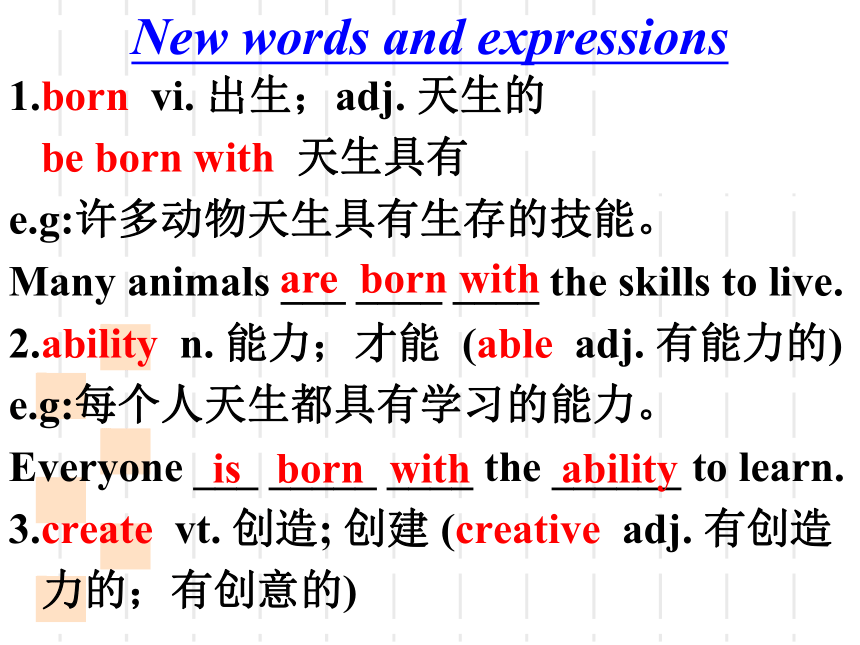
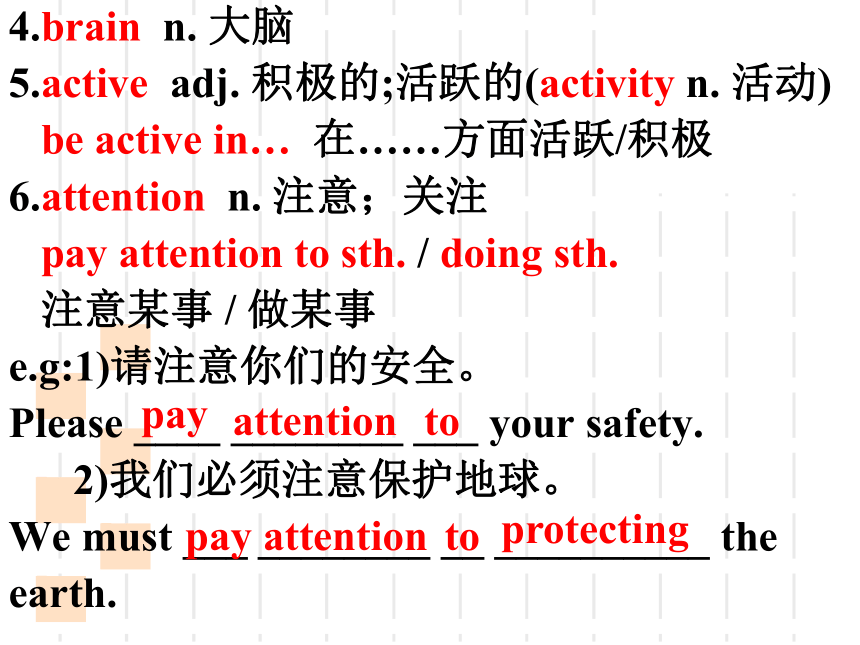
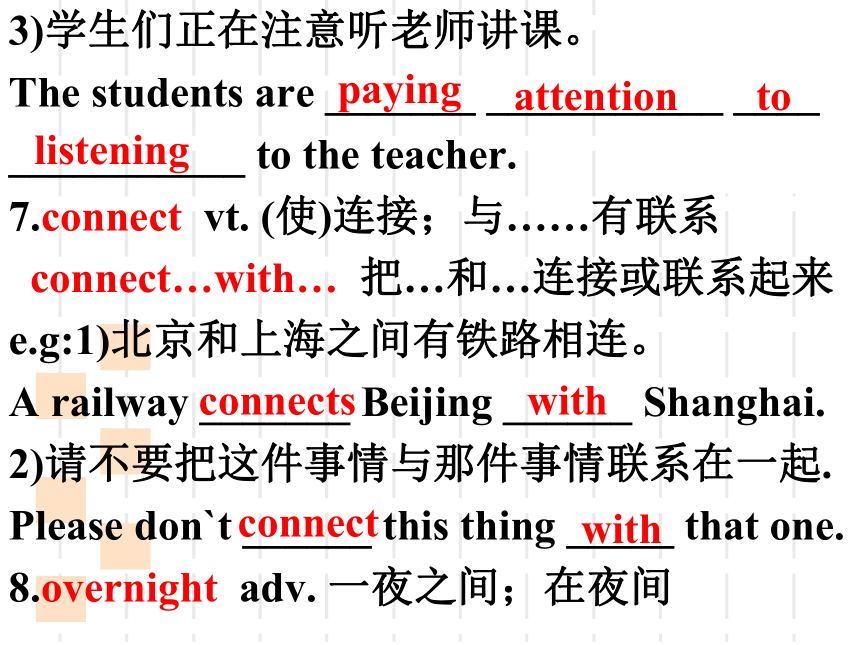
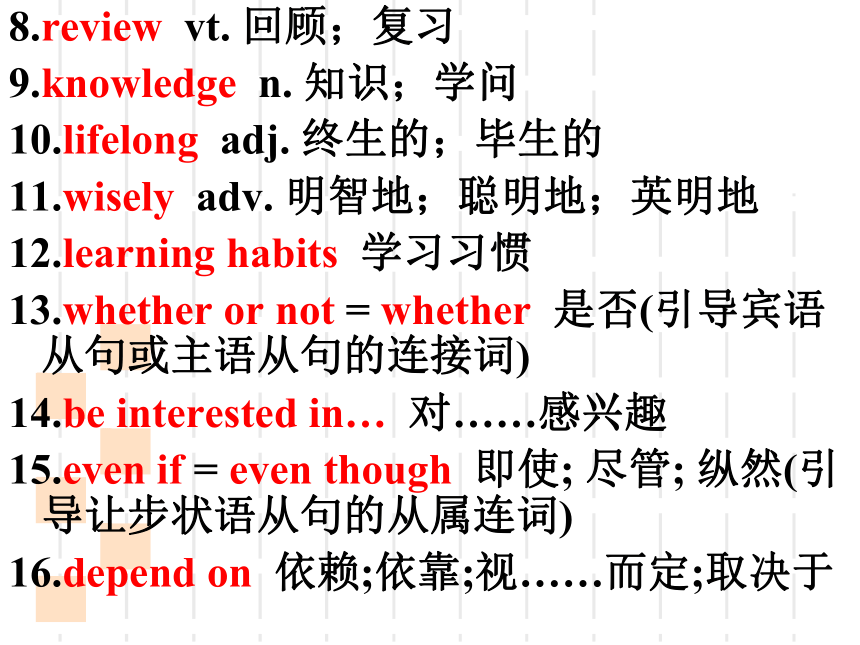
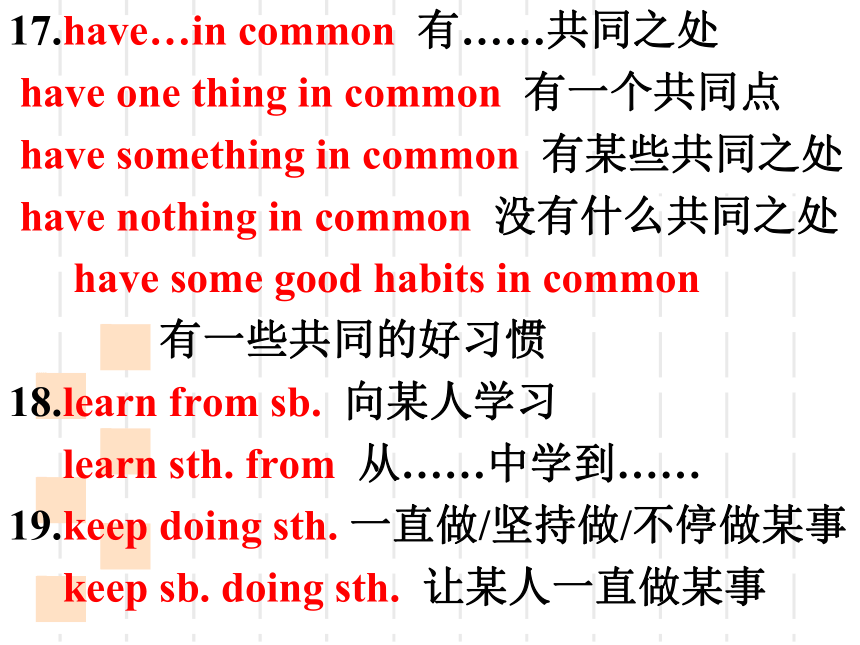
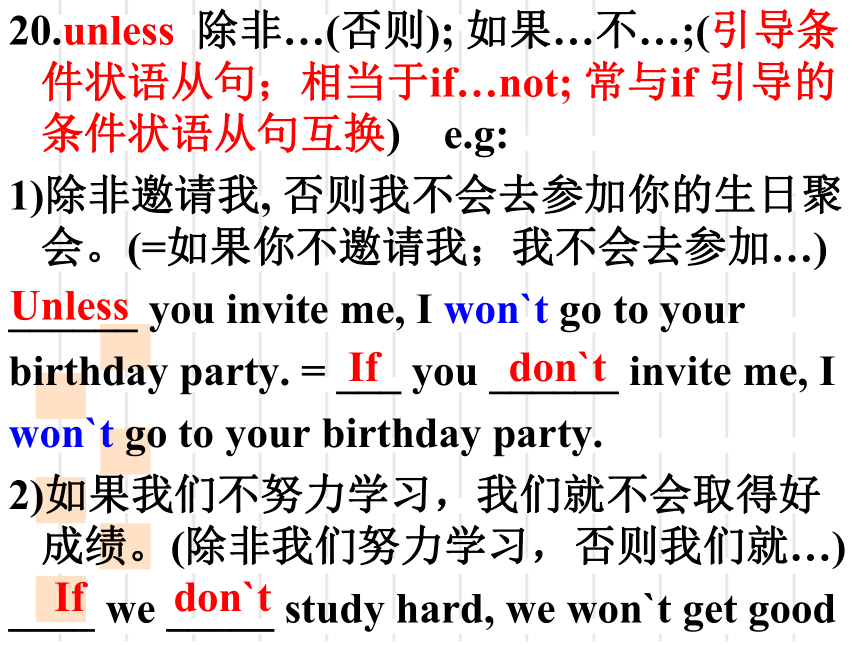
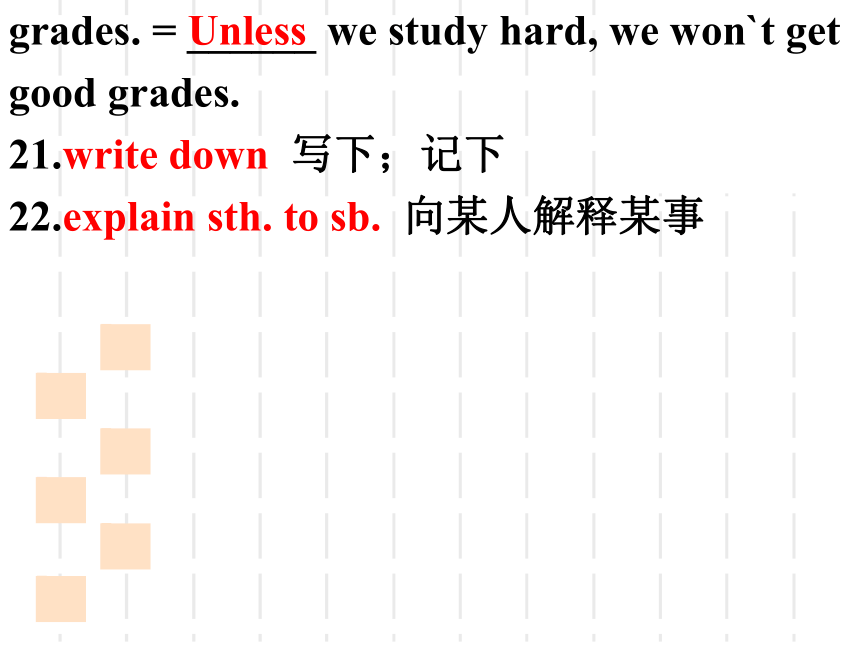
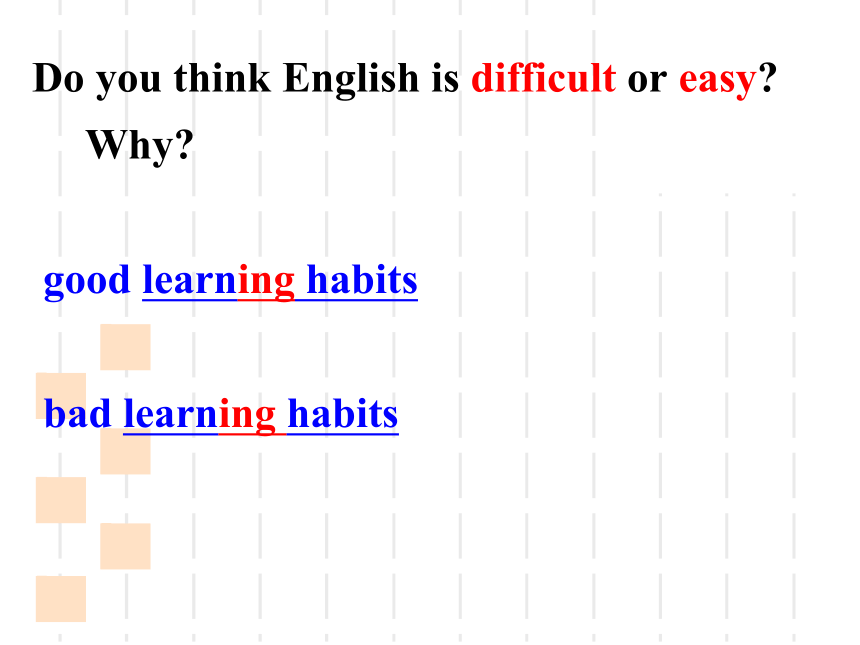
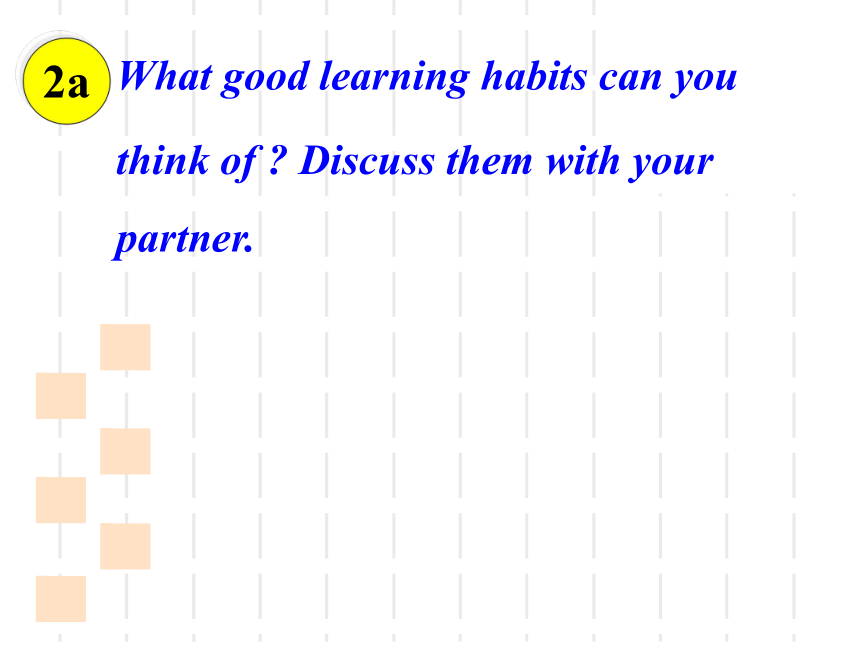
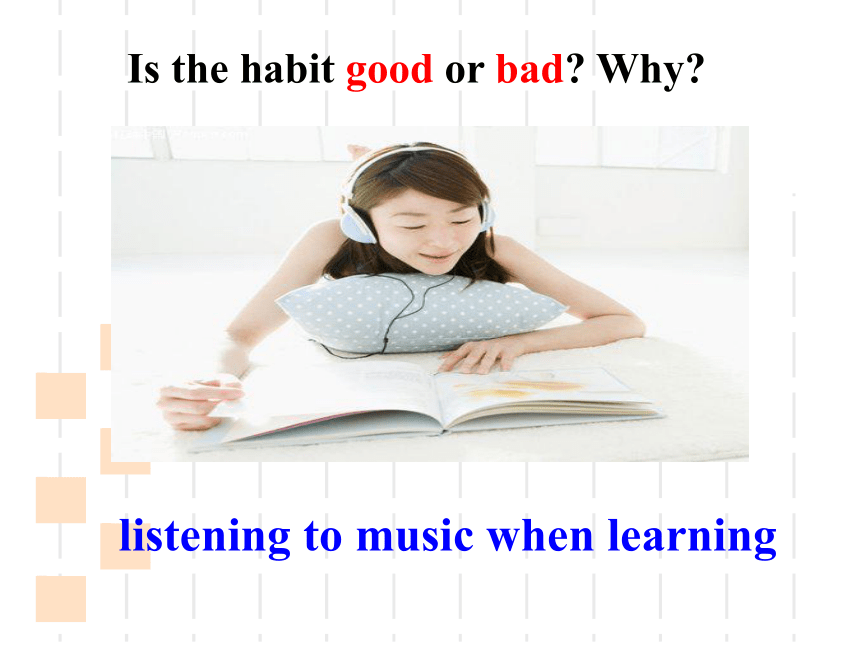
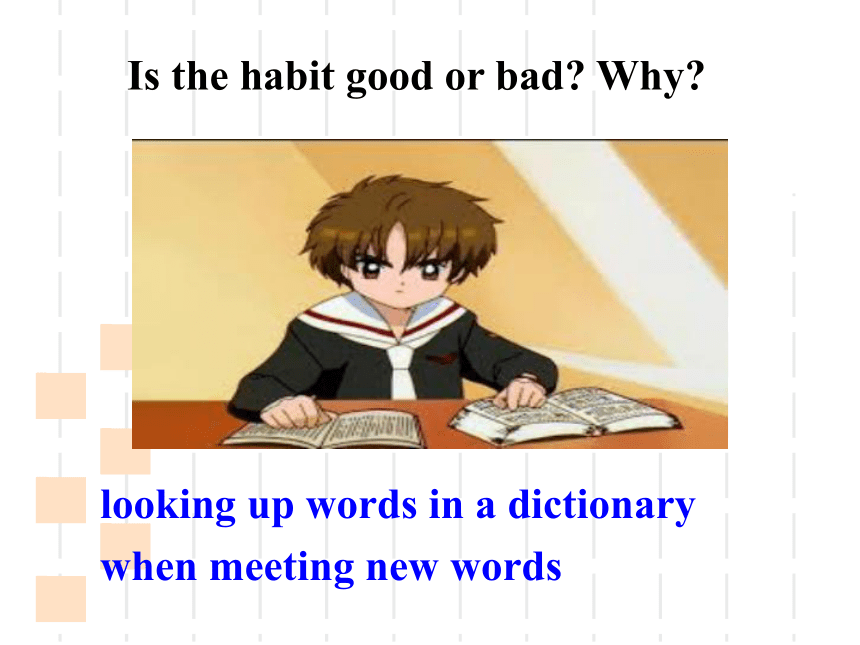
文档简介
(共43张PPT)
Section B(2a—3b)
New words and expressions
1.born vi. 出生;adj. 天生的
be born with 天生具有
e.g:许多动物天生具有生存的技能。
Many animals ___ ____ ____ the skills to live.
2.ability n. 能力;才能 (able adj. 有能力的)
e.g:每个人天生都具有学习的能力。
Everyone ___ _____ ____ the ______ to learn.
3.create vt. 创造; 创建 (creative adj. 有创造
力的;有创意的)
are
born
with
is
born
with
ability
4.brain n. 大脑
5.active adj. 积极的;活跃的(activity n. 活动)
be active in… 在……方面活跃/积极
6.attention n. 注意;关注
pay attention to sth. / doing sth.
注意某事 / 做某事
e.g:1)请注意你们的安全。
Please ____ ________ ___ your safety.
2)我们必须注意保护地球。
We must ___ ________ __ __________ the
earth.
pay
attention
to
pay
attention
to
protecting
3)学生们正在注意听老师讲课。
The students are _______ ___________ ____
___________ to the teacher.
7.connect vt. (使)连接;与……有联系
connect…with… 把…和…连接或联系起来
e.g:1)北京和上海之间有铁路相连。
A railway _______ Beijing ______ Shanghai.
2)请不要把这件事情与那件事情联系在一起.
Please don`t ______ this thing _____ that one.
8.overnight adv. 一夜之间;在夜间
paying
attention
to
listening
connects
with
connect
with
8.review vt. 回顾;复习
9.knowledge n. 知识;学问
10.lifelong adj. 终生的;毕生的
11.wisely adv. 明智地;聪明地;英明地
12.learning habits 学习习惯
13.whether or not = whether 是否(引导宾语从句或主语从句的连接词)
14.be interested in… 对……感兴趣
15.even if = even though 即使; 尽管; 纵然(引导让步状语从句的从属连词)
16.depend on 依赖;依靠;视……而定;取决于
17.have…in common 有……共同之处
have one thing in common 有一个共同点
have something in common 有某些共同之处
have nothing in common 没有什么共同之处
have some good habits in common
有一些共同的好习惯
18.learn from sb. 向某人学习
learn sth. from 从……中学到……
19.keep doing sth. 一直做/坚持做/不停做某事
keep sb. doing sth. 让某人一直做某事
20.unless 除非…(否则); 如果…不…;(引导条件状语从句;相当于if…not; 常与if 引导的条件状语从句互换) e.g:
1)除非邀请我, 否则我不会去参加你的生日聚会。(=如果你不邀请我;我不会去参加…)
______ you invite me, I won`t go to your
birthday party. = ___ you ______ invite me, I
won`t go to your birthday party.
2)如果我们不努力学习,我们就不会取得好成绩。(除非我们努力学习,否则我们就…)
____ we _____ study hard, we won`t get good
Unless
If
don`t
If
don`t
grades. = ______ we study hard, we won`t get
good grades.
21.write down 写下;记下
22.explain sth. to sb. 向某人解释某事
Unless
Do you think English is difficult or easy
Why
good learning habits
bad learning habits
What good learning habits can you
think of Discuss them with your
partner.
2a
listening to music when learning
Is the habit good or bad Why
looking up words in a dictionary when meeting new words
Is the habit good or bad Why
learning from the mistakes in time
Is the habit good or bad Why
asking questions
Is the habit good or bad Why
copying friends’ homework
develop study skills
培养学习技巧
drawing mind maps
画思维导图
USING DICTIONARIES使用词典:
This can help you find the definition that matches the context of the word in the text.
这帮助你们找到与课本上下文单词相匹配的定义
1)Creating an interest in what they learn.(激发他们对所学内容的兴趣)
2)Practicing and learning from mistakes.(练习并从错误中学习)
3)Developing their study skills.(培养他们的学习技能)
4)Asking questions.(问问题)
Read the passage quickly. Which four
habits of successful learners can you find
from the passage
2b
Read the passage again and answer the questions .
2C
How many paragraphs in the passage
Read paragraph by paragraph and answer the questions in 2c.
six.
1. Does the writer think that everyone is born
with the ability to learn well Do you agree
Why or why not
Read paragraph 1 and answer the question.
No, he doesn’t.
Yes, I do. Because whether or not you can do this well depends on your learning habits.
Para 1.
2. Why is it a good idea to connect something you
need to learn with something you are
interested in
Because if you are interested in something, your brain is more active and it is also easier for you to pay attention to it for a long time.
Read paragraph 2 and answer the question.
Para 2.
3. What do the sayings “Use it or lose it" and
“Practice makes perfect" mean Do you agree
with them
1. Even if you learn something well, you will forget it unless you use it.
2. We should keep practicing what we have learned so that we can be good at it.
3. Yes, I do.
Para 3.
Read paragraph 3 and answer the questions.
4. Do good learners learn from mistakes, or are they afraid of making mistakes
They learn from mistakes.
Para 3.
5. What study skills does the writer talk about
Do you have those study skills
Taking notes by writing down key words or by drawing mind maps, looking for ways to review what they have learned, and doing this by reading their notes every day or by explaining the information to another student.
Para 4.
Read paragraph 4 and answer the question.
6. Do you agree that learning is a lifelong
journey Why or why not
Yes. I do. Because every day brings
something new.
Para 6.
Read paragraph 6 and answer the question.
How Can You Become a Successful Learner
Everyone is born with the ability to learn. But
whether or not you can do this well depends
on your learning habits. Research shows that
successful learners have some good habits in
common.
Creating an interest in what they learn
Studies show that if you are interested in something,
your brain is more active and it is also easier for
you to pay attention to it for a long time. Good
learners often connect what they need to learn with
something interesting. For example, if they need
to learn English and they like music or sports, they
can listen to English songs or watch sports
programs in English. This way they will not get
bored.
Practicing and learning from mistakes
Good learners think about what they are good at
and what they need to practice more. Remember,
“use it or lose it”! Even if you learn something well,
you will forget it unless you use it. “Practice makes
perfect.” Good learners will keep practicing what
they have learned, and they are also not afraid of
making mistakes. Alexander Graham Bell did not
invent the telephone overnight. He succeeded by
trying many times and learning from his mistakes.
Developing their study skills
It is not enough to just study hard. Good learners
know the best way they study. For example, they
may take notes by writing down key words or by
drawing mind maps. They also look for ways to
review what they have learned. They may do this
by reading their notes every day or by explaining
the information to another student.
Asking questions
Good learners often ask questions during or after class. They even ask each other and try to find out the answers. Knowledge comes from questioning.
Learning is a life-long journey because every day brings something new. Everything that you learn becomes a part of you and changes you, so learn wisely and learn well.
Look up the following words from the
passage in the dictionary. Then write a sentence for each word.
brain n. connect v. overnight adv. attention n. review v. knowledge n. ability n. active adj. wisely adv.
e.g. brain: A good way to train the brain is to do some math exercises every day.
2d
Your friend wants to improve his/her English and asks you for help. What are the three best ways to learn and why Make some notes in the chart.
Best ways to learn Reasons Examples
1.
2.
3.
3a
Best ways to learn Reasons Examples
1. Being interested
in what you do If you are interested in something, your brain will be more active and it is also easier for you to pay attention to it for a long time. If you like music, you can learn English by listening to English songs.
Best ways to learn Reasons Examples
2. Developing
study skills It’s not enough to just study hard.
You should know the best way you can study. You can take notes by writing down key words
or by drawing a mind map.
3. Practicing Practice makes
perfect. Keep practicing
what you’ve
learned.
Write a letter to your friend. Give him/her some advice about the best ways to learnEnglish.Use your notes in 3a.
Try to use the following expressions to help you:
There are three good ways to learn English.
I think you should ...
If you do this, you will ...
It is also a good idea to ... because ...
You could try to improve your English by ...
This will help you to ...
3b
单元写作训练
英语作文的写作方法
(三段四步法):
一.审题:
a.文章的体裁;
b.文章主要使用的时态;
c.文章主要使用的人称;
d.文章的词数;
二.列提纲(在大脑中):
三.组词成句:
a.文章的开头、正文及结尾怎么写;
b.文章会用到哪些已学过的重要的短
语和句型?
a.尽量多使用已学过的重要短语、句
型及语法结构以增加分值;
b.注意使用衔接词和过渡词来增加文
章结构的层次感及逻辑性;
c.立意要积极向上,避免颓废和消极;
四.检查:
a.有没有错词、错句及汉语式英语;
b.标点符号是否正确;
【写作模板】
【参考范文】
Dear Li Ming,
I know you want to improve your English and you need some help. There are three good ways to learn English.
First, I think you should be interested in learning English first. If you do this, your brain will be more active and it’s also easier for you to pay attention to it for a long time. You can connect learning English with something interesting. For example, if you like music or movies, you can listen to English songs or watch English-language movies. Second, it is also a good idea to develop your study
skills because it’s not enough to just study hard. You should find the best way you can study. For example, you can take notes by writing down key words or by drawing a mind map.Third, you could try to improve your English by practicing more. This will help you to improve your English listening, speaking, writing and so on. Remember, “Practice makes perfect. ”You should keep practicing what you’ve learned and you shouldn’t be afraid of making mistakes. No one can succeed overnight.
I hope all these will be helpful to you.
Yours,
Mary
Section B(2a—3b)
New words and expressions
1.born vi. 出生;adj. 天生的
be born with 天生具有
e.g:许多动物天生具有生存的技能。
Many animals ___ ____ ____ the skills to live.
2.ability n. 能力;才能 (able adj. 有能力的)
e.g:每个人天生都具有学习的能力。
Everyone ___ _____ ____ the ______ to learn.
3.create vt. 创造; 创建 (creative adj. 有创造
力的;有创意的)
are
born
with
is
born
with
ability
4.brain n. 大脑
5.active adj. 积极的;活跃的(activity n. 活动)
be active in… 在……方面活跃/积极
6.attention n. 注意;关注
pay attention to sth. / doing sth.
注意某事 / 做某事
e.g:1)请注意你们的安全。
Please ____ ________ ___ your safety.
2)我们必须注意保护地球。
We must ___ ________ __ __________ the
earth.
pay
attention
to
pay
attention
to
protecting
3)学生们正在注意听老师讲课。
The students are _______ ___________ ____
___________ to the teacher.
7.connect vt. (使)连接;与……有联系
connect…with… 把…和…连接或联系起来
e.g:1)北京和上海之间有铁路相连。
A railway _______ Beijing ______ Shanghai.
2)请不要把这件事情与那件事情联系在一起.
Please don`t ______ this thing _____ that one.
8.overnight adv. 一夜之间;在夜间
paying
attention
to
listening
connects
with
connect
with
8.review vt. 回顾;复习
9.knowledge n. 知识;学问
10.lifelong adj. 终生的;毕生的
11.wisely adv. 明智地;聪明地;英明地
12.learning habits 学习习惯
13.whether or not = whether 是否(引导宾语从句或主语从句的连接词)
14.be interested in… 对……感兴趣
15.even if = even though 即使; 尽管; 纵然(引导让步状语从句的从属连词)
16.depend on 依赖;依靠;视……而定;取决于
17.have…in common 有……共同之处
have one thing in common 有一个共同点
have something in common 有某些共同之处
have nothing in common 没有什么共同之处
have some good habits in common
有一些共同的好习惯
18.learn from sb. 向某人学习
learn sth. from 从……中学到……
19.keep doing sth. 一直做/坚持做/不停做某事
keep sb. doing sth. 让某人一直做某事
20.unless 除非…(否则); 如果…不…;(引导条件状语从句;相当于if…not; 常与if 引导的条件状语从句互换) e.g:
1)除非邀请我, 否则我不会去参加你的生日聚会。(=如果你不邀请我;我不会去参加…)
______ you invite me, I won`t go to your
birthday party. = ___ you ______ invite me, I
won`t go to your birthday party.
2)如果我们不努力学习,我们就不会取得好成绩。(除非我们努力学习,否则我们就…)
____ we _____ study hard, we won`t get good
Unless
If
don`t
If
don`t
grades. = ______ we study hard, we won`t get
good grades.
21.write down 写下;记下
22.explain sth. to sb. 向某人解释某事
Unless
Do you think English is difficult or easy
Why
good learning habits
bad learning habits
What good learning habits can you
think of Discuss them with your
partner.
2a
listening to music when learning
Is the habit good or bad Why
looking up words in a dictionary when meeting new words
Is the habit good or bad Why
learning from the mistakes in time
Is the habit good or bad Why
asking questions
Is the habit good or bad Why
copying friends’ homework
develop study skills
培养学习技巧
drawing mind maps
画思维导图
USING DICTIONARIES使用词典:
This can help you find the definition that matches the context of the word in the text.
这帮助你们找到与课本上下文单词相匹配的定义
1)Creating an interest in what they learn.(激发他们对所学内容的兴趣)
2)Practicing and learning from mistakes.(练习并从错误中学习)
3)Developing their study skills.(培养他们的学习技能)
4)Asking questions.(问问题)
Read the passage quickly. Which four
habits of successful learners can you find
from the passage
2b
Read the passage again and answer the questions .
2C
How many paragraphs in the passage
Read paragraph by paragraph and answer the questions in 2c.
six.
1. Does the writer think that everyone is born
with the ability to learn well Do you agree
Why or why not
Read paragraph 1 and answer the question.
No, he doesn’t.
Yes, I do. Because whether or not you can do this well depends on your learning habits.
Para 1.
2. Why is it a good idea to connect something you
need to learn with something you are
interested in
Because if you are interested in something, your brain is more active and it is also easier for you to pay attention to it for a long time.
Read paragraph 2 and answer the question.
Para 2.
3. What do the sayings “Use it or lose it" and
“Practice makes perfect" mean Do you agree
with them
1. Even if you learn something well, you will forget it unless you use it.
2. We should keep practicing what we have learned so that we can be good at it.
3. Yes, I do.
Para 3.
Read paragraph 3 and answer the questions.
4. Do good learners learn from mistakes, or are they afraid of making mistakes
They learn from mistakes.
Para 3.
5. What study skills does the writer talk about
Do you have those study skills
Taking notes by writing down key words or by drawing mind maps, looking for ways to review what they have learned, and doing this by reading their notes every day or by explaining the information to another student.
Para 4.
Read paragraph 4 and answer the question.
6. Do you agree that learning is a lifelong
journey Why or why not
Yes. I do. Because every day brings
something new.
Para 6.
Read paragraph 6 and answer the question.
How Can You Become a Successful Learner
Everyone is born with the ability to learn. But
whether or not you can do this well depends
on your learning habits. Research shows that
successful learners have some good habits in
common.
Creating an interest in what they learn
Studies show that if you are interested in something,
your brain is more active and it is also easier for
you to pay attention to it for a long time. Good
learners often connect what they need to learn with
something interesting. For example, if they need
to learn English and they like music or sports, they
can listen to English songs or watch sports
programs in English. This way they will not get
bored.
Practicing and learning from mistakes
Good learners think about what they are good at
and what they need to practice more. Remember,
“use it or lose it”! Even if you learn something well,
you will forget it unless you use it. “Practice makes
perfect.” Good learners will keep practicing what
they have learned, and they are also not afraid of
making mistakes. Alexander Graham Bell did not
invent the telephone overnight. He succeeded by
trying many times and learning from his mistakes.
Developing their study skills
It is not enough to just study hard. Good learners
know the best way they study. For example, they
may take notes by writing down key words or by
drawing mind maps. They also look for ways to
review what they have learned. They may do this
by reading their notes every day or by explaining
the information to another student.
Asking questions
Good learners often ask questions during or after class. They even ask each other and try to find out the answers. Knowledge comes from questioning.
Learning is a life-long journey because every day brings something new. Everything that you learn becomes a part of you and changes you, so learn wisely and learn well.
Look up the following words from the
passage in the dictionary. Then write a sentence for each word.
brain n. connect v. overnight adv. attention n. review v. knowledge n. ability n. active adj. wisely adv.
e.g. brain: A good way to train the brain is to do some math exercises every day.
2d
Your friend wants to improve his/her English and asks you for help. What are the three best ways to learn and why Make some notes in the chart.
Best ways to learn Reasons Examples
1.
2.
3.
3a
Best ways to learn Reasons Examples
1. Being interested
in what you do If you are interested in something, your brain will be more active and it is also easier for you to pay attention to it for a long time. If you like music, you can learn English by listening to English songs.
Best ways to learn Reasons Examples
2. Developing
study skills It’s not enough to just study hard.
You should know the best way you can study. You can take notes by writing down key words
or by drawing a mind map.
3. Practicing Practice makes
perfect. Keep practicing
what you’ve
learned.
Write a letter to your friend. Give him/her some advice about the best ways to learnEnglish.Use your notes in 3a.
Try to use the following expressions to help you:
There are three good ways to learn English.
I think you should ...
If you do this, you will ...
It is also a good idea to ... because ...
You could try to improve your English by ...
This will help you to ...
3b
单元写作训练
英语作文的写作方法
(三段四步法):
一.审题:
a.文章的体裁;
b.文章主要使用的时态;
c.文章主要使用的人称;
d.文章的词数;
二.列提纲(在大脑中):
三.组词成句:
a.文章的开头、正文及结尾怎么写;
b.文章会用到哪些已学过的重要的短
语和句型?
a.尽量多使用已学过的重要短语、句
型及语法结构以增加分值;
b.注意使用衔接词和过渡词来增加文
章结构的层次感及逻辑性;
c.立意要积极向上,避免颓废和消极;
四.检查:
a.有没有错词、错句及汉语式英语;
b.标点符号是否正确;
【写作模板】
【参考范文】
Dear Li Ming,
I know you want to improve your English and you need some help. There are three good ways to learn English.
First, I think you should be interested in learning English first. If you do this, your brain will be more active and it’s also easier for you to pay attention to it for a long time. You can connect learning English with something interesting. For example, if you like music or movies, you can listen to English songs or watch English-language movies. Second, it is also a good idea to develop your study
skills because it’s not enough to just study hard. You should find the best way you can study. For example, you can take notes by writing down key words or by drawing a mind map.Third, you could try to improve your English by practicing more. This will help you to improve your English listening, speaking, writing and so on. Remember, “Practice makes perfect. ”You should keep practicing what you’ve learned and you shouldn’t be afraid of making mistakes. No one can succeed overnight.
I hope all these will be helpful to you.
Yours,
Mary
同课章节目录
- Unit 1 How can we become good learners.
- Section A
- Section B
- Unit 2 I think that mooncakes are delicious!
- Section A
- Section B
- Unit 3 Could you please tell me where the restroom
- Section A
- Section B
- Unit 4 I used to be afraid of the dark.
- Section A
- Section B
- Unit 5 What are the shirts made of?
- Section A
- Section B
- Review of Units 1-5
- Unit 6 When was it invented?
- Section A
- Section B
- Unit 7 Teenagers should be allowed to choose their
- Section A
- Section B
- Unit 8 It must belong to Carla.
- Section A
- Section B
- Unit 9 I like music that I can dance to.
- Section A
- Section B
- Unit 10 You're supposed to shake hands.
- Section A
- Section B
- Review of Units 6-10
- Unit 11 Sad movies make me cry.
- Section A
- Section B
- Unit 12 Life is full of the unexpected
- Section A
- Section B
- Unit 13 We're trying to save the earth!
- Section A
- Section B
- Unit 14 I remember meeting all of you in Grade 7.
- Section A
- Section B
- Review of Units 11-14
